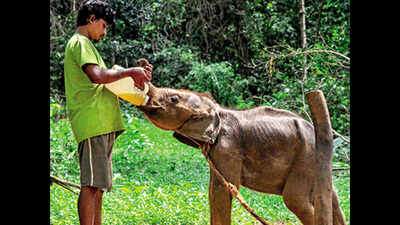- News
- City News
- guwahati News
- Assam: Majuli emerges as human-jumbo conflict zone
Trending
This story is from August 13, 2020
Assam: Majuli emerges as human-jumbo conflict zone
As India joined World Elephant Day celebrations on Wednesday, wildlife experts in Assam expressed concern over the shrinking habitats and corridors of wild elephants and increasing human-elephant conflicts in newer areas away from reserve forests.

A zoo-keeper feeds an elephant calf in Guwahati on Wednesday
GUWAHATI: As India joined World Elephant Day celebrations on Wednesday, wildlife experts in Assam expressed concern over the shrinking habitats and corridors of wild elephants and increasing human-elephant conflicts in newer areas away from reserve forests.
Experts feel there is no scarcity of food for elephants in the northeast, but encroachment in the shape of human settlements and agricultural activities, has forced them out of their natural habitats, thereby leading to conflict.
Rathin Barman, joint director of the Wildlife Trust of India (WTI), said the world’s largest riverine island, Majuli, may turn into the new theatre of conflict as forest areas in the northern banks of the Brahmaputra, spread over the districts of Sonitpur, Lakhimpur and the neighbouring areas, have shrunk.
“Elephants move from one area to another for food. Of late, we are seeing that they are coming to Majuli all the way from the northern bank of the Brahmaputra. This can bring them in conflict with the farmers. They have already started destroying their crops,” he said. Shrinking habitats in the reserve forest areas of Goalpara, Sonitpur, Udalguri and Golaghat have turned the four districts of Assam into hotspots of human-elephant conflict. Barman added that without a long term resolution to restore the degraded habitats and clear the corridors, World Elephant Day celebrations cannot yield fruitful results.
As per the 2017 census, India is home to 27,312 elephants, accounting for 55% of the total world elephant population. Among all the states, Assam has the second highest number of elephants after Karnataka (6,049). “The elephant population in Assam increased from 5,246 in 2002 to 5,719 in 2017. But now they face a serious challenge due to dwindling forest areas. Kaziranga has 1,163 elephants as per the 2017 estimation. That excluded 63 departmental elephants at KNP,” said Ravindra Sharma, research officer at the park.
World Elephant Day was observed at the world heritage site.
KNP director P Sivakumar, among others, attended the World Elephant Day programme at the park and stressed on the Kaziranga-Karbi Anglong elephant project to facilitate uninterrupted movement of elephants in the geographically one landscape and beyond.
The Kaziranga-Karbi Anglong area has two elephant reserves, the Kaziranga-Karbi Anglong elephant reserve with an area of 8,270 square km, and the Dhansiri-Lungding Elephant Reserve with 2,740 square km. Senior landscape coordinator at WWF-India, Pranab Jyoti Bora, said the entire area is important for elephant migration from central to western parts of Assam through Lumding and Hojai up to Meghalaya.
Experts feel there is no scarcity of food for elephants in the northeast, but encroachment in the shape of human settlements and agricultural activities, has forced them out of their natural habitats, thereby leading to conflict.
Rathin Barman, joint director of the Wildlife Trust of India (WTI), said the world’s largest riverine island, Majuli, may turn into the new theatre of conflict as forest areas in the northern banks of the Brahmaputra, spread over the districts of Sonitpur, Lakhimpur and the neighbouring areas, have shrunk.
“Elephants move from one area to another for food. Of late, we are seeing that they are coming to Majuli all the way from the northern bank of the Brahmaputra. This can bring them in conflict with the farmers. They have already started destroying their crops,” he said. Shrinking habitats in the reserve forest areas of Goalpara, Sonitpur, Udalguri and Golaghat have turned the four districts of Assam into hotspots of human-elephant conflict. Barman added that without a long term resolution to restore the degraded habitats and clear the corridors, World Elephant Day celebrations cannot yield fruitful results.
Of the 16-18 main corridors in the state connecting two elephant habitats, about 50% have been encroached upon and do not support movement of elephants. “Only nine corridors in Kaziranga are comparatively clear,” he said.
As per the 2017 census, India is home to 27,312 elephants, accounting for 55% of the total world elephant population. Among all the states, Assam has the second highest number of elephants after Karnataka (6,049). “The elephant population in Assam increased from 5,246 in 2002 to 5,719 in 2017. But now they face a serious challenge due to dwindling forest areas. Kaziranga has 1,163 elephants as per the 2017 estimation. That excluded 63 departmental elephants at KNP,” said Ravindra Sharma, research officer at the park.
World Elephant Day was observed at the world heritage site.
KNP director P Sivakumar, among others, attended the World Elephant Day programme at the park and stressed on the Kaziranga-Karbi Anglong elephant project to facilitate uninterrupted movement of elephants in the geographically one landscape and beyond.
The Kaziranga-Karbi Anglong area has two elephant reserves, the Kaziranga-Karbi Anglong elephant reserve with an area of 8,270 square km, and the Dhansiri-Lungding Elephant Reserve with 2,740 square km. Senior landscape coordinator at WWF-India, Pranab Jyoti Bora, said the entire area is important for elephant migration from central to western parts of Assam through Lumding and Hojai up to Meghalaya.
End of Article
FOLLOW US ON SOCIAL MEDIA











